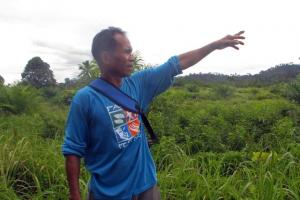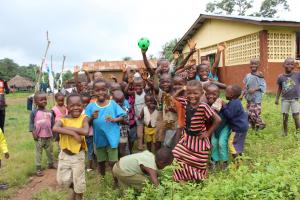Palawan, located between the Sulu and South China seas, is one of the most beautiful islands of the Philippine archipelago. The island is 450 kilometers long and 40 kilometers at its widest portion. Along its gorgeous beaches - framed by mangroves and by the last remaining lowland evergreen forest - coral reefs are home to unique marine biodiversity.
Large-Scale Tree Plantations
Industrial tree plantations are large-scale, intensively managed, even-aged monocultures, involving vast areas of fertile land under the control of plantation companies. Management of plantations involves the use of huge amounts of water as well as agrochemicals—which harm humans, and plants and animals in the plantations and surrounding areas.
Bulletin articles
29 January 2012
Bulletin articles
29 January 2012
During 11 years - from 1991 to 2002 - a harsh civil war fueled by the inequitable distribution of power and resources decimated the population of Sierra Leone. The country now faces a state of food insecurity and has become a net food importer attributed not only to the war but also to World Bank and IMF recipes. With the aim of fostering a market-based economy, those institutions imposed policies that curtailed state agricultural programs and investments in agriculture.
Other information
30 December 2011
On December 3, 2011, a front page article in the Dutch newspaper Volkskrant, denounced that the Dutch pension fund, ABP, one of the biggest in the world, is investing money through the Global Solidarity Forest Fund (GSFF), an initiative of Swedish and Norwegian Churches, in a monoculture tree plantation project of pine and eucalyptus in Mozambique that is affecting negatively peasant communities (see WRM publication of 2010: www.wrm.org.uy/paises/Mozambique/livro.pdf).
Other information
30 December 2011
Governor Jacques Wagner and Environment Secretary Eugênio Spengler are preparing to give the people of the extreme south, south and southwest regions of the state of Bahia a SPECIAL CHRISTMAS PRESENT on December 21. The news has been leaked that regardless of the shortcomings of the corresponding EIA/RIMA (Environmental Impact Study/Environmental Impact Report), authorization will be granted for the expansion planned by Veracel Celulose. Although the EIA/RIMA contains numerous errors, this will pose no impediment.
Bulletin articles
30 December 2011
Since December is the month in which International Human Rights Day is commemorated, we feel it is urgent to highlight the cases of two communities in countries that seem very distant from one another and yet have a great deal in common. In Honduras and India, these communities have been struggling for years against the new form of colonialism represented by powerful economic groups connected with oil palm plantations and the iron and steel industry, respectively.
Bulletin articles
30 December 2011
A new report published in November 2011, exposes how local police in the Province of Jambi on the Indonesian island of Sumatra, working with oil palm plantation staff, systematically evicted people from three settlements, firing guns to scare them off and then using heavy machinery to destroy their dwellings and bulldoze concrete floors into the nearby creeks. The operations were carried out over a week in mid-August and have already sparked an international controversy. Andiko, Executive Director of the Indonesian community rights NGO, HuMa said:
Bulletin articles
30 November 2011
A new expansion cycle: carbon and biomass plantations
Bulletin articles
30 November 2011
Next week an international farmers' conference will take place in Mali to stop land grabbing. Organized by La Via Campesina, it is aimed at opening a space to listen to and learn from local peasants, mainly from African countries, on what they have to say about land grabbing and to unite forces to resist the process and build future strategies.
Bulletin articles
30 November 2011
The state of Acre, in the Brazilian Amazon region, earned worldwide attention in the late 1980s through the struggle for social and environmental justice waged by the late Chico Mendes. In more recent years, the state has once again gained prominence in Brazil and internationally, but for very different reasons. This time the spotlight on the state is a result of the propaganda around the “green” development model promoted through “forest governance” and based on the so-called “sustainable management” of the forests and the sale of environmental services.
Bulletin articles
30 November 2011
The new abstractions created by the climate change discourse in the form of REDD and REDD+ have come to deepen the commodification of forests as greater mobility is created and trading across countries and continents is made possible through climate mitigation and forestry schemes, say Kanchi Kohli and Manju Menon from the Indian organization Kalpavriksh, in the recent publication “Banking on Forests: Assets for a Climate Cure?”
Other information
30 October 2011
The Uruguayan economy is largely dependent on agriculture and livestock raising, in which the dairy industry plays an important role. The production of milk and other dairy products is mainly concentrated in three departments, two of which – San José and Colonia – present a diverse collection of family farms and an organized local society that have achieved favourable levels of income and quality of life, making this one of the most productive and successful regions in rural Uruguay.
Other information
30 October 2011
Oxfam International recently released an eye-opening report on the activities of UK-based New Forests Company (NFC) in Uganda. The company currently plants and harvests timber on 27,000 hectares of tree plantations in Uganda, Tanzania, Rwanda and Mozambique, and has deals in these countries totalling around 90,000 hectares. It claims that the timber produced can satisfy all the population's needs, thereby preventing logging in natural forests. In Uganda it has planted around 9,300 hectares of pine and eucalyptus trees since 2006, on land licensed to the company by the government.


